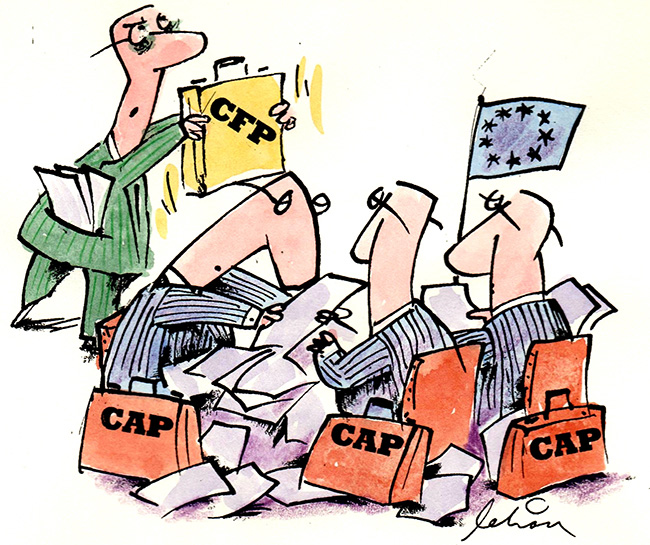IPES-Food presents a plan to transform the European Union food system, including proposals for 80 policy reforms and a new governance architecture.
In February the International Panel of Experts on Sustainable Food Systems (IPES-Food) published the report “Towards a common food policy for the European Union”. It is an ambitious piece of writing in which, following a consultation process with stakeholders, they propose 80 policy reforms that together would contribute to “address climate change, halt biodiversity loss, curb obesity, and make farming viable for the next generation”.
As the title hints, they suggest an overarching Common Food Policy in contrast to the existing Common Agricultural Policy (CAP). Olivier De Schutter, IPES-Food co-chair and lead author, said:
“A Common Food Policy can spark a whole sale transition to sustainable food systems in a way that the CAP, as a Common Agricultural Policy, cannot.”
They set five objectives for a Common Food Policy:
- Ensuring access to land, water and healthy soils
- Rebuilding climate-resilient, healthy agro-ecosytems
- Promoting, healthy and sustainable diets for all
- Building fairer, shorter and cleaner supply chains
- Putting trade in the service of sustainable development
The policy proposals that they put forward deal with a wide range of policy areas, since the food system is affected by agricultural, environmental and trade legislation. Some areas are covered by EU competence today, some are not.
Quite a few proposals address the current CAP. In the short term, they suggest to:
- Scrap coupled payments to livestock and allow them only for “nitrogen-fixing leguminous crops, permanent grasslands/pastures, fruit & vegetable production, and trees (agro-forestry)”
- Reform and expand the conditionality for direct payments (pillar 1) so it includes “specific clauses of Water Framework, Nitrates & Sustainable Use of Pesticides Directives” and trees as Landscape Features
- Dedicate at least half of EU CAP funding to Rural Development (pillar 2) and introduce an “agroecology premium” under pillar 2
In the medium and longer term, they propose to:
- Abandon the income-support logic and move all CAP payments to a single pillar where payments are based on public goods provision
- Phase out all coupled payments
- Introduce livestock density limits in line with the Organic regulation
Another area of concern is farm advisory services. Though they have great potential to spread knowledge about sustainable management, in many cases they are the same enterprises as those selling inputs to the farm. To ensure independence and quality they should be certified at EU level. This also includes a short-term proposal to promote environmentally friendly practices, for example sustainable soil management.
In the longer term, IPES call for an EU Soil & Land Directive. This is not too far-fetched, since a proposal for a Soil Directive was on the table back in 2014, but the Commission decided to withdraw it because of lack of support. However, IPES also wants to include regulations for sustainable land development, as well as integrating new soil management requirements into CAP conditionalities.
There are also several policy proposals aimed at supporting a dietary shift towards a more sustainable diet. In the short term, they suggest to:
- Exempt fruit and vegetables from VAT
- Develop EU and national dietary guidelines for healthy and sustainable diets
- Ensure that public procurement supports sustainable farming and healthy diets
- In the longer term, they argue that a reform of the CAP would make sustainable food cheaper and more accessible for everyone.
- Some of the reforms are about streamlining other sets of policies so they also contribute to a sustainable food system, e.g.:
- Make access to EU Structural Funds conditional on sustainable land use under integrated territorial food system planning
- Introduce sustainability criteria (incl. biodiversity and climate indicators) for EU aid and investment flows, including EIP
- Introduce CO2 tax (border adjustment) and exclude high-GHG goods from liberalisation
- Explore a sustainable development clause and/or a Climate Change Waiver within WTO Agreements
The report also highlights the need to challenge existing power structures, and Olivier De Schutter explains that “the most ambitious reforms — the reforms we most urgently need —will only become viable on the basis of reclaiming decision-making processes from powerful lobbies, bringing new actors around the table, shaping policies in more democratic ways, and allowing new priorities and new coalitions of interest to emerge.”
To give sustainable food systems greater priority they suggest to:
- Dedicate one of the vice-presidents’ positions in the European Commission to sustainable food systems
- The European Parliament should form a formal intergroup on food. An intergroup is a forum for MEPs to exchanges of views on particular subjects and promote contacts between MEPs and civil society
- The European Political Strategy Centre (EPSC), which is the European Commission’s in-house think tank, should develop a “Sustainable Food Taskforce” with the purpose of setting a long-term vision for the European Commission
- Appoint a “head of food” in each of the DGs (departments of the European Commission), in order to break the current silo-thinking
They also stress the need for stakeholder engagement in the policy process and suggest a “European Food Policy Council” and “participatory process for assessing technological innovations”.
“Ultimately, this report is a call to action,” De Schutter concludes, calling on the European institutions to take on the challenge of working with all food system actors to complete, adopt, and implement a food policy for Europe. “The Common Food Policy offers a Plan B for Europe: a way to reclaim public policy for the public good and to rebuild trust in the European project.”
Kajsa Pira
“Towards a common food policy for the European Union” by IPES-Food: http://www.ipes-food.org/eu-common-food-policy
The International Panel of Experts on Sustainable Food Systems (IPES-Food) was estanlished in 2016. It is an indepdent think-tank that brings together expert voices from different disciplines and different types of knowledge to inform the policy debate on how to reform food systems across the world.































